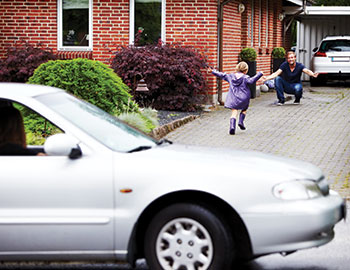Experienced Overland Park Family Lawyers Advise on Parenting Time and Plans
Visitation lawyers protect your rights and your child’s welfare
Visitation, also called parenting time, is the right of nonresidential parents to have frequent, meaningful contact to maintain a loving relationship with their children. Although Kansas family law presumes that visitation with a nonresidential parent is in the best interest of the child, specific facts can overcome that presumption, allowing a judge to place restrictions on visitation or prohibit contact with the child altogether. For these reasons, it’s important to seek representation from an experienced family law attorney. At The Henry Law Firm, P.A., we draw on 30 years of combined experience to manage visitation disputes for your benefit and for your child’s welfare. We also help grandparents obtain visitation orders whenever appropriate.
Who can petition for child visitation in Kansas?
A nonresidential parent can file for visitation with a child as part of a divorce proceeding or after establishing paternity. The court will order visitation if, after examining all the facts and applying relevant factors, it finds that visitation is in the best interests of the child. When you petition for visitation, or parenting time, there are three possible outcomes:
- Regular visitation — The court orders parenting time as part of a parenting plan for the child. Visitation can be according to a fixed schedule or set parameters with the details to be worked out between the parents. This type of visitation can include overnights and trips.
- Supervised visitation — If there is reasonable suspicion that contact with the parent will be contrary to the child’s best interests, the court can order visits to be supervised by a neutral party. The supervisor is usually a trained professional, such as a psychologist or social worker, who can observe the interactions between parent and child and report to the court.
- No visitation — If there is conclusive evidence that contact with the parent would be detrimental to the child, the court can prohibit visitation. This is often the case when a parent has a substance abuse problem or a history of domestic abuse.
The court retains jurisdiction over the parenting time order and can modify the order when there is a substantial change in circumstances. For example, if a parent is cleared of false allegations of abuse, the court can lift restrictions and allow unsupervised visitation. Or, if a parent overcomes addiction, the court can permit some level of visitation.
The residential parent has a duty to make the child ready for parenting time. Any interference with parenting time can draw court sanctions for contempt of court. In fact, if the interference is extreme, the nonresidential parent can petition the court to change the order and even grant joint residential custody as a remedy.
Under certain circumstances, grandparents can petition for visitation:
- Following a divorce
- After the grandparent’s child has died
The grandparents must have established a relationship with the child, and the court must believe that visitation with the grandparent(s) is in the child’s best interests.
Our attorneys are adept at reaching negotiated settlements on child custody and visitation issues. We also provide determined representation when these issues must go to trial.
Contact our Overland Park child custody lawyers for your visitation dispute.
The Henry Law Firm, P.A. cares about your relationship with your children. We want to help you obtain a visitation order that serves your child’s best interests and allows you to maintain a loving relationship. To schedule a consultation in Overland Park, call us at 913-381-5020 or contact our firm online.


